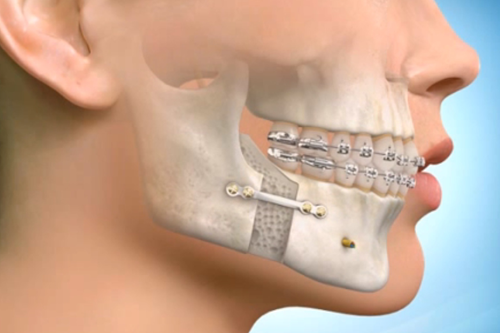
Orthognathic surgery, also known as jaw surgery, is done to readjust or realign the jaw and correct jaw bone abnormalities arising from congenital defects, injuries, or abnormal jaw bone growth.
About Orthognathic Surgery
Orthognathic surgery is usually recommended if your jaw issues cannot be resolved by orthodontics alone. It is a major operation performed under general anaesthesia by an oral or maxillofacial surgeon. Read below to know more about orthognathic surgery, its types, how it is performed, the benefits, complications, and so on.
Who Qualifies for Orthognathic Surgery?
The best time for orthognathic surgery is after the growth of the jaw bone has stopped, which usually occurs in the late teens or early 20s. A maxillofacial surgeon or a dental specialist near you, who has been trained in the knowledge of orthognathic surgery, will be able to advise if such a surgery is suitable for you.
Why is Orthognathic Surgery Conducted?
Orthognathic surgery is conducted to help with the following medical issues:
- Improving the alignment of your teeth when the mouth is closed to adjust the bite
- Correcting the symmetry of the face
- Repairing congenital defects, such as the cleft palate
- Fixing facial misalignment from injuries
- Relieving breathing issues such as obstructive sleep apnea or mouth breathing
- Improving mouth functions such as chewing, biting, and swallowing
- Provides relief from pain due to temporomandibular joint dysfunction (TMJ)
Who Can Perform Orthognathic Surgery?
In most cases, orthognathic surgery is performed by an oral and maxillofacial surgeon working along with an orthodontist. Visit the best dental hospital in Chennai to consult an oral and maxillofacial surgeon.
How is Orthognathic Surgery Performed?
In orthognathic surgery, the procedure is usually performed inside the mouth; thus, no incision scars are visible outside the face. Sometimes, however, a few minor incisions may need to be performed outside the mouth as well.
Orthognathic surgery is performed under general anaesthesia. The surgeon may make cuts in the jaw bone and bring it into correct alignment. The jaw bone is then held in this position with the help of bone plates, wires, or screws, and allowed to heal.
What are the Different Types of Orthognathic Surgery?
- Maxillary osteotomy surgery is performed on the upper jaw (maxilla).
- Mandibular osteotomy surgery is performed on the lower jaw (mandible).
- Bimaxillary osteotomy is performed on both the upper and lower jaws.
- Genioplasty surgery is performed on the chin.
What are the Benefits of Orthognathic Surgery?
Benefits of orthognathic surgery include:
- Increases self-confidence with a better appearance on the face.
- Enhances the function of teeth, such as biting and chewing.
- Improves speech impairment.
- Improves breathing and swallowing.
- Relieves pain due to temporomandibular joint dysfunction (TMJ).
What are the Possible Complications of Orthognathic Surgery?
Possible complications of orthognathic surgery include:
- Blood loss
- Nerve injury
- Jawbone fracture
- Relapse of jaw misalignment
- Loss of a piece of jawbone
- Need for root canal treatment of a few teeth
Conclusion
Orthognathic surgery can positively alter a patient’s life greatly by improving the facial appearance and function of the jawbone and teeth. It should be understood; however, that it is major surgery with a recovery period of six months or more. Thus, you must discuss with a maxillofacial surgeon or the best de
It is important to undergo orthognathic surgery at a well-equipped dental hospital performed by an expert oral and maxillofacial surgeon to get the best results.
Request an appointment at. Apollo Dental, Chennai Call 1800 1020 288 to book an appointment.


















































